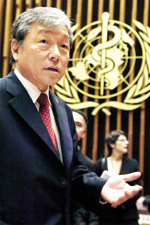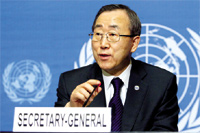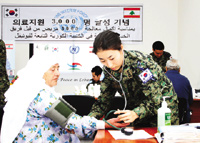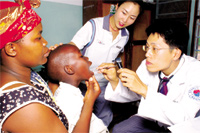The Republic of Korea joined the United Nations in September 1991, expanding its active participation in multilateral diplomacy in tandem with its elevated global standing economically. Even before joining the UN, however, the Republic of Korea was active in such specialized UN agencies as the International Monetary Fund (IMF), the International Bank for Reconstruction and Development (IBRD), the United Nations Industrial Development Organization (UNIDO), and the United Nations Educational, Scientific and Cultural Organization (UNESCO), as well as the General Agreement on Tariffs and Trade (GATT) and other key inter-governmental bodies.

Dr Lee Jong-wook: Prior to his work as WHO Director-General, Dr Lee was a world leader in the fight against two of the greatest challenges to international health and development - tuberculosis, and vaccine preventable diseases of children. Dr Lee Jongwook died on the morning of 22 May 2006 following a sudden illness.
It has also helped to launch the Goodwill Ambassadors Program adopted by the UN International Drug Control Program as part of activities for the UN Decade Against Drug Abuse. Korea hosted the 18th session of the Meeting of Heads of National Drug Law Enforcement Agencies, Asia and the Pacific in Seoul in September 1993.
As a member of the UN, the Republic of Korea stepped up efforts to expand its global role. In 1992, the nation became a member of several important UN bodies, such as the Commission on Crime Prevention and Criminal Justice, the Governing Council of the United Nations Development Program (UNDP), the Commission on Human Rights and the Committee for Program and Coordination. At the 47th session of the General Assembly in October 1992, the Republic of Korea was elected to the UN Economic and Social Council, one of the principal UN organs along with the Security Council and the General Assembly. Korea's financial contribution to the UN's regular budget amounted to US$44 million in 2007, placing it 11th among all member states.
At the Economic and Social Council (ECOSOC) session in January 1993, the Republic of Korea was elected to serve as a vice-president and also became the chairman of the ECOSOC Committee. The Republic of Korea was also elected to the Commission on Sustainable Development, a new commission established under the ECOSOC in February 1993 to coordinate and monitor environmental and developmental activities.

U.N. Secretary-General Ban Ki-moon of the Republic of Korea, the eighth Secretary-General of the United Nations, brings to his post 37 years of service in government and on the global stage. At the time of his election as Secretary-General, Mr. Ban was his country's Minister of Foreign Affairs and Trade.
Throughout its nearly two decades in the UN, the Republic of Korea has participated actively in major issues handled by the world body such as conflict prevention and peacekeeping missions, disarmament talks, environmental protection, development projects and human rights protection. In particular, its role as a non-permanent member in the Security Council from 1996-1997 provided invaluable experience. During its tenure, Korea contributed constructively in the discussions to address major regional conflicts by highlighting the problem of "political refugees."
As a peace-loving member of the UN, Korea is committed to the maintenance of international peace and security and is therefore actively participating in UN peacekeeping activities. Since the Republic of Korea joined the UN in 1991, it has dispatched 920 troops to UN peacekeeping operations, including UNOSOM II in Somalia, UNAVEM II in Angola, UNTAET in East Timor, UNFICYP in Cyprus, MINURSO in Western Sahara, and ONUB in Burundi.

S. Korea's Dongmyeong unit in the city of Tyr, southern Lebannon, treated a total of 3,000 local patients within 8 months.
Right now, 38 Koreans are dispatched to UNMOGIP in India/Pakistan, UNOMIG in Georgia, UNMIL in Liberia, UNAMA in Afghanistan, UNMIS in Sudan, UNMIT in East Timor and UNMIN in Nepal. 350 infantry troops were sent to UNIFIL (Lebanon) in July last year, so a total of 401 troops are dispatched to a total of eight peacekeeping missions, which is the 37th largest number of troops dispatched to peacekeeping operations among the UN member states.
In addition to those, Korea has a number of troops dispatched to war zones such as Iraq and, until recently, Afghanistan as well.
Developing countries often face serious problems because they lack experience in preparing economic plans, procuring necessary investment capital and executing the economic policies necessary for sustained economic growth. The Republic of Korea's developmental experience, therefore, can be a model for such nations.
Korea had already begun assisting developing countries in the 1960s by hosting small numbers of trainees and dispatching a few experts overseas. After 1975, when its economy had reached a higher level, Korea began to increase its assistance in a variety of forms: grants of machinery and materials, construction technology aid, Economic Development Cooperation Fund (EDCF) loans and direct personnel assistance, especially through the Youth Volunteer Program.
The Republic of Korea also provided assistance to developing countries through multilateral organizations such as the IMF, IBRD, ADB and nearly a dozen other international financial organizations.
In April 1991, the Republic of Korea created the Korea International Cooperation Agency (KOICA) under the Ministry of Foreign Affairs to consolidate its assistance to developing countries. It provides technical and financial aid to developing countries and shares Korea's development experience and expertise.

The KOICA stresses poverty eradication and is actively participating in efforts to achieve international development goals and solve global issues, such as sustainable socioeconomic development and improved governance in developing countries.
KOICA implements various cooperation programs such as dispatching medical doctors, industry experts, taekwondo instructors and other volunteers, inviting trainees to Korea and assisting non-governmental organizations. KOICA contributes to enhancing Korea's image through establishing cooperative relationships with developing countries. Korea contributed US$455 million in Official Development Aid (ODA) in 2006.
The Republic of Korea is committed to the pursuit of cultural exchanges with foreign countries to enhance bilateral friendship and understanding and to contribute to global reconciliation and cooperation. The nation also seeks to introduce Korean traditional art and culture abroad, and supports overseas Korean studies programs as well as numerous academic conferences and athletic exchanges. The Korea Foundation, established in 1991, coordinates and supports international cultural exchange programs.